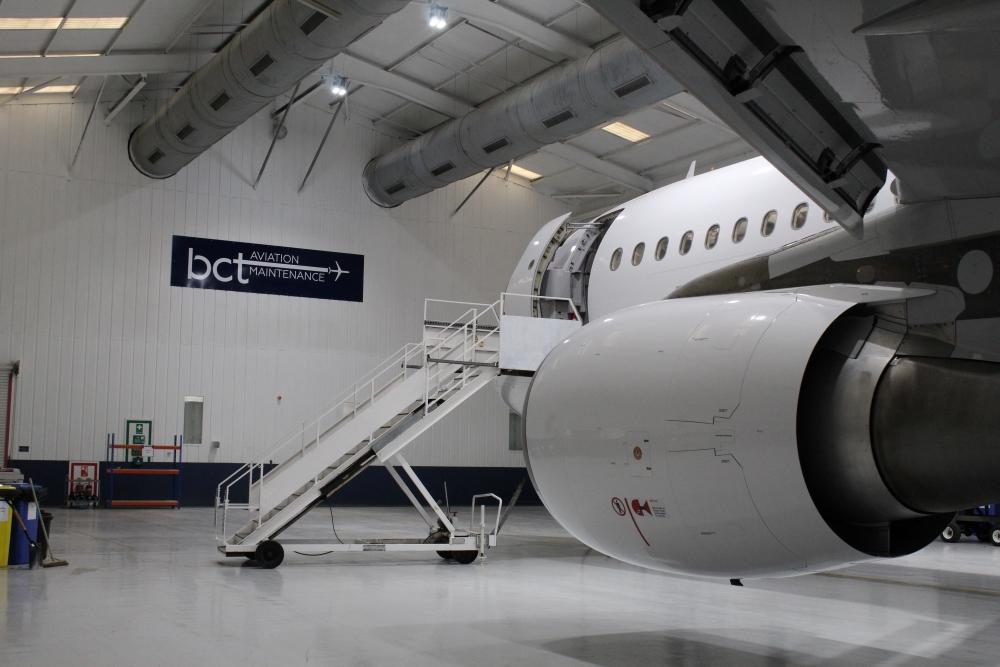
UK-based MRO provider BCT Aviation Maintenance plans to grow its existing base and line maintenance service capabilities while further digitalizing maintenance processes through the rollout of a new software platform.
The company, headquartered at East Midlands Airport in Derby, provides multiple Part 145 repair services including base maintenance for Boeing 737 CL/NG and Airbus A320 aircraft. In addition, it runs a line maintenance operation for narrowbody and widebody aircraft in Derby, as well as several other line stations in the UK and Ireland.
BCT recently submitted an application to the UK Civil Aviation Authority to add C check capability at its Derby main base, where it carries out the majority of its MRO activity.
Its base maintenance facility, called 'Hangar 30,' opened in 2021 at the height of the COVID-19 pandemic. The facility has a capacity of around 26,000 ft.2 and can accommodate one narrowbody aircraft at a time.
In addition, it is also seeking line maintenance capability additions. “BCT is also pleased to announce full 24/7 coverage at our BHX line maintenance station to raise the level of service there,” says Simon Beken, commercial manager at BCT.
In order to support the ramp-ups, the MRO specialist announced in late June that it had signed up for Rusada’s Envision maintenance software, which it will use to digitalize its maintenance processes.
Chris Taylor, technical director at BCT Aviation Maintenance, says the company developed the need for a better software fit as it looked to expand its base maintenance capability.
"We are excited to see the benefits Envision will bring to all aspects of BCT by providing a clear view of our operating protocols, from commercial engagement with potential customers to our own operational day-to-day needs, and all the way through to customer billing," he says.
BCT is optimistic about market growth, having endured a challenging period at the height of the pandemic. Naturally, the locked down environment of early 2021 meant base maintenance demand from airline customers was significantly impacted.
“This aspect of the business immediately faced a catastrophic drop in demand for base maintenance as a high proportion of commercial aircraft were parked due to the COVID restrictions,” says Beken.
Line maintenance was also heavily impacted overall, but the company did see some revenue drivers from increased demand for the care and maintenance of parked aircraft assets, Beken says.
He notes that the company’s line station in Shannon, Ireland played an important role in supporting the lessor market during the pandemic period. BCT also witnessed a surge in cargo flights, necessitating increased line maintenance support, particularly at its East Midlands Airport headquarters.
In addition, Beken says the pandemic resulted in lessors having an increased requirement to directly manage the maintenance needs of their assets. The MRO provider seized this opportunity to develop strong relationships with lessors.
Supply chain disruptions emerged as another significant challenge for the MRO provider. “The major supply chain issue in recent months has been how to grow the labor force,” Beken says.
Furthermore, he adds that delays in acquiring flight-critical components and parts kits from OEMs further compounded existing supply chain obstacles.
Increasing costs and general price inflation are another major challenge for the company. “Due to the shortage of aircraft engineers and mechanics, labor costs have rapidly increased," he says, noting that the BCT is seeing a large increase for the rental costs of its airside property. “Such cost increases can only be passed on directly to our customer,” he adds.
Looking ahead, Beken notes the pressing challenge for BCT is the need to grow the business amidst a shortage of licensed aircraft engineers. To address this issue, BCT has focused on enhancing workplace packages and benefits to attract and retain talent.
It also looking to other routes to maintain a talent pipeline. “We are actively looking at ex-military aviation personnel as a quality source for employees entering commercial aviation,” Beken says.

